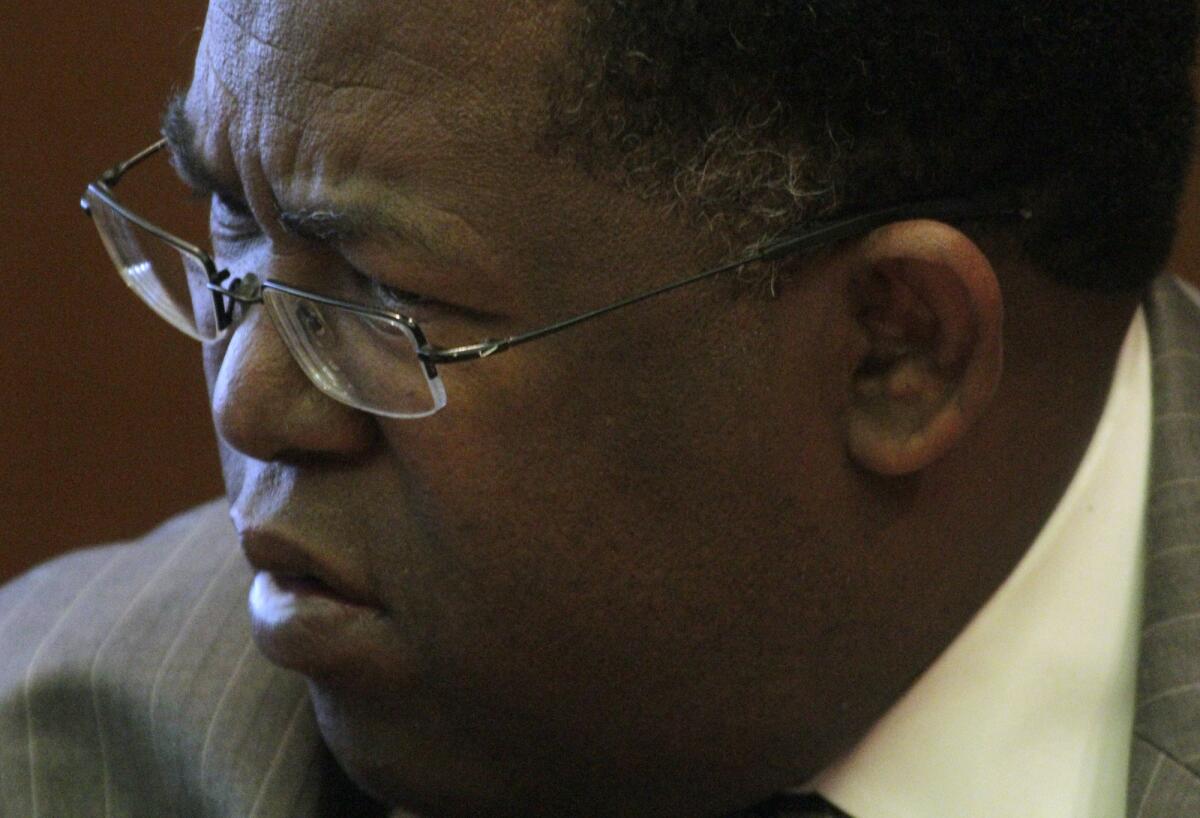Coliseum commissioner Ridley-Thomas tied to questionable expenditure

- Share via
By the time the NFL’s Carolina Panthers took the field for the 2009 season, the Los Angeles Memorial Coliseum had been out of the pro football business for more than a decade.
But that didn’t stop a member of the Coliseum’s governing commission, Los Angeles County Supervisor Mark Ridley-Thomas, from using his position at the agency to score $560 worth of Panthers tickets on the public’s dime.
Neither Ridley-Thomas nor the commission reported the gift of the tickets in financial disclosures required by state law, and their value exceeded the legal limit on gratuities for government officials.
After The Times obtained Coliseum records about the purchase, Ridley-Thomas reimbursed the agency -- two years after he received the tickets -- officials said.
The transaction is the first to tie a commissioner directly to a questionable expense at the Coliseum, whose finances have been the subject of 10 months of Times reports. The conflict-of-interest scandal has involved top managers and others at the stadium and companion Sports Arena. Several no longer work there as a result, and the reports have spurred two investigations and a city audit.
Ridley-Thomas declined to be interviewed. His spokeswoman, Lisa Richardson, said he had asked a commission official to arrange for the Panthers tickets but did not expect the official or the Coliseum to pay for them.
“It was not an attempt to get free tickets,” Richardson said.
Coliseum invoices show that the stadium’s finance director, Ronald Lederkramer, bought the tickets on his personal credit card and the commission reimbursed him with government funds. The invoices were released to The Times in August under the California Public Records Act.
Three weeks later, the commission requested the reimbursement from Ridley-Thomas and received it shortly afterward, according to copies of letters the panel sent to him. But the commission did not make that information public until Nov. 23, in response to Times inquiries about the purchase. The agency also has not released a copy of the reimbursement check.
A commission attorney, who reports to Ridley-Thomas and his fellow commissioners, said in an email to The Times that the supervisor had not paid for the tickets for two years because he was waiting to hear how much he owed.
“It is a common practice of professional courtesy for organizations to arrange ticket sales for those with whom it has business relationships,” Principal Deputy County Counsel Thomas Faughnan said in the email. “The Supervisor expected to pay the full cost of the transaction . The Supervisor would need to be notified of the precise cost because there are often additional fees beyond the face-value of tickets.”
Faughnan did not respond to a request for clarification of any business relationships involved in the ticket purchase.
In a letter dated Sept. 12, Coliseum Interim General Manager John Sandbrook asked Ridley-Thomas, one of his bosses, for the reimbursement and apologized for the “delay” in doing so.
Richardson declined to say why Ridley-Thomas didn’t ask for a bill or whether the supervisor had secured NFL tickets through the commission on other occasions.
State regulations generally require officials to disclose gifts of free tickets and prohibit them from accepting any gratituity from a single source above a certain value. In 2009, when the tickets were purchased, that amount was $420.
The state also requires agencies to disclose on their websites gifts of tickets to their officials, along with a description of the public purpose of the gifts or a declaration that the tickets were distributed to the officials as income.
In early 2009, the Coliseum Commission adopted a written policy on free tickets to comply with California rules. The policy grants free tickets to commissioners and select staff members for all events at the Coliseum and Sports Arena.
Under some circumstances, the policy also allows commissioners to get free tickets from outside sources. It states that giving the officials tickets “serves the important public purpose of enabling those charged with operating the Coliseum and Sports Arena, and maximizing the use of these facilities for the public benefit, to obtain first-hand knowledge of all facets of the conduct of events at these venues and facilities.”
The policy does not specifically mention pro football tickets. The Coliseum lost its last NFL team, the Raiders, in the mid-1990s.
The financial scandal began unfolding in February, with Times reports that then-General Manager Patrick Lynch had allowed his events manager, Todd DeStefano, to work on the side with a concert promoter that produced raves at the Coliseum and Sports Arena.
Two small firms that DeStefano launched while he worked for the Coliseum collected more than $1.8 million in payments from rave promoters and other companies that did business at the property, according to records and interviews. DeStefano resigned in January and Lynch in February.
More recently, The Times reported that Lynch received personal payments of more than $300,000 from a Coliseum janitorial contractor, money deposited over several years in a Miami bank account. The Los Angeles County district attorney’s office is investigating DeStefano’s and Lynch’s dealings.
DeStefano is also under investigation by the FPPC. He and Lynch have denied doing anything wrong.
The district attorney’s office has raided properties associated with Lynch, DeStefano and two rave companies. The Coliseum Commission has sued the four, seeking restitution and damages. Separately, City Controller Wendy Greuel is auditing the Coliseum’s books.
Meanwhile, unable to pay for stadium upgrades it promised USC, the Coliseum has been forced to seek a new pact that would give the university day-to-day control of the historic venue, the site of two Summer Olympics.
More to Read
Sign up for Essential California
The most important California stories and recommendations in your inbox every morning.
You may occasionally receive promotional content from the Los Angeles Times.












